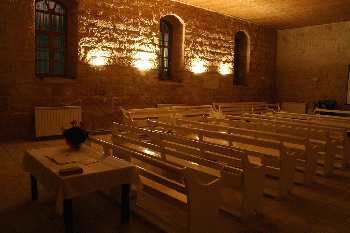
The Ramallah Friends Meeting has been active since the late 1800s.
(Image by delayed gratification from flickr) Details DMCA
The Ramallah Friends Meeting has been active since the late 1800s.
Last month, after I described my understanding of the events that led to the war that started on October 7th in "Mapping Conflict," I saw several films about Palestine in 1920 and 1948. I began to learn history that I had no idea I did not know.
I watched Mark Jonathan Harris' The Long Way Home, released in 1997. It tells the story of Holocaust survivors' efforts, from 1945-1948, to make a home for themselves after they had lost their families and most countries did not welcome them.
The similarities between Jewish Holocaust survivors' experiences and Palestinian experiences in 1948 and now are startling.
Here are the films about Palestinian history:
1948: Creation and Catastrophe, a 2018 documentary directed by Andy Trimlett and Ahlam Muhtaseb, reports that after the Holocaust, the UK and the UN declared that the land that had been Palestine for thousands of years would become a Jewish state Israel. War ensued. Both sides committed massacres; massacres of Palestinians far outnumbered those of Israelis. 300-400 Palestinian villages were depopulated. Palestinians call this period of Israel's creation 'Al Nakba' - the Catastrophe. 750,000 Palestinians became refugees.
Tantura, Alon Schwartz' 2022 film, re-examines an alleged massacre committed in 1948 in one Palestinian village and the story of researcher Teddy Katz. Katz conducted hundreds of interviews in the 1990s about the massacre in Tantura. Later, he was sued for defamation and a judge refused to permit his tapes to be heard in court. "If you love Israel," filmmaker Alon Schwartz said in 2022, "hold it accountable." https://archive.org/details/tantura_2022
Palestine 1920: The Other Side of the Palestinian Story shows that 100 years ago, Palestine was a thriving economic and cultural center.
I also recommend Helen Epstein's 1979 book, Children of the Holocaust: Conversations with Sons and Daughters of Survivors. Both of Epstein's parents survived concentration camps. In her twenties, she traveled from the U.S. to Europe and Israel to find people "who, like me, were possessed by a history they had never lived." Her book explores intergenerational transmission of trauma.
What does healing look like after a holocaust, after a massacre? Maybe South Africa's Truth and Reconciliation Commission can provide clues.
Meanwhile, I sketched a list: After a massacre, human beings need a place to settle. They need water, food and shelter. They need to know how to heal gunshot wounds, stop bleeding, set bones, heal infections, deliver babies, tend to the dying and bury the dead. They need resilient self-esteem. They must generate money and start small farms. Keep available vehicles and communications systems running. Dispose of hazardous waste appropriately. Know how to rest. They should know how to generate electricity, build a communications system, bank, resolve conflicts and build roads. They should encourage children's creativity and teach reading and writing with minimal or no Internet access. They'll need skills in listening, cooperating and dreaming realistically. They'll need gratitude for the day.
Honestly, I consider this list untenable.
(Note: You can view every article as one long page if you sign up as an Advocate Member, or higher).





